In today’s fast-paced business world, continuous learning and development have become integral components of corporate success. As organizations strive to keep their workforce up-to-date with the latest skills and knowledge, they rely on efficient Learning Management Systems (LMS) to deliver and manage training programs effectively. With a myriad of LMS options available, it can be challenging for businesses to identify the ideal platform that aligns with their specific needs.
In this blog, we will explore the top corporate Learning Management Systems, offering insights into their features, advantages, and how they can benefit your organization’s learning and development initiatives. Whether you’re a small business or a large enterprise, this guide will help you make an informed decision about the LMS that best suits your needs.
Top 5 corporate learning management systems
1. Moodle
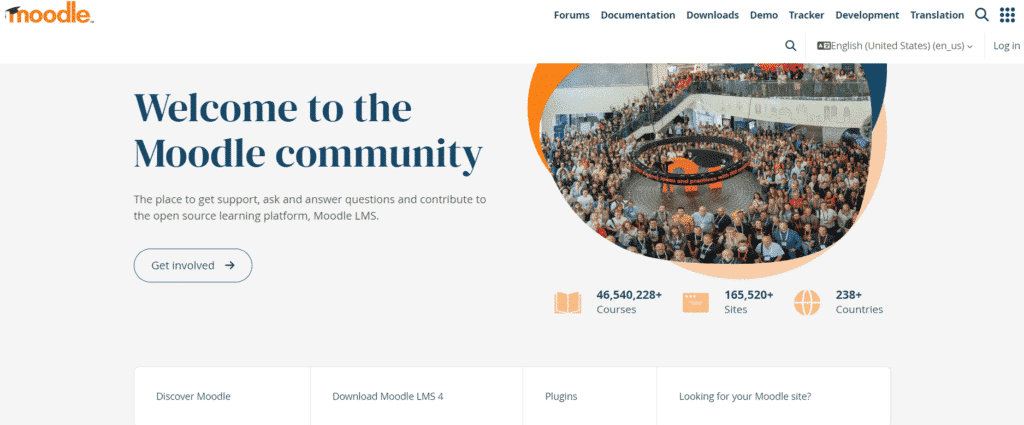
Moodle is an open-source Learning Management System known for its flexibility and robust features. It provides a highly customizable platform that allows organizations to create and manage online courses, training materials, and assessments. Moodle is popular for its extensive community support and scalability, making it suitable for both small businesses and large enterprises. It also offers comprehensive reporting tools to track learner progress and engagement.
Features:
- Open-source LMS
- Highly customizable
- Robust community support
- Scalable for large organizations
- Comprehensive reporting
2. Canvas by Instructure
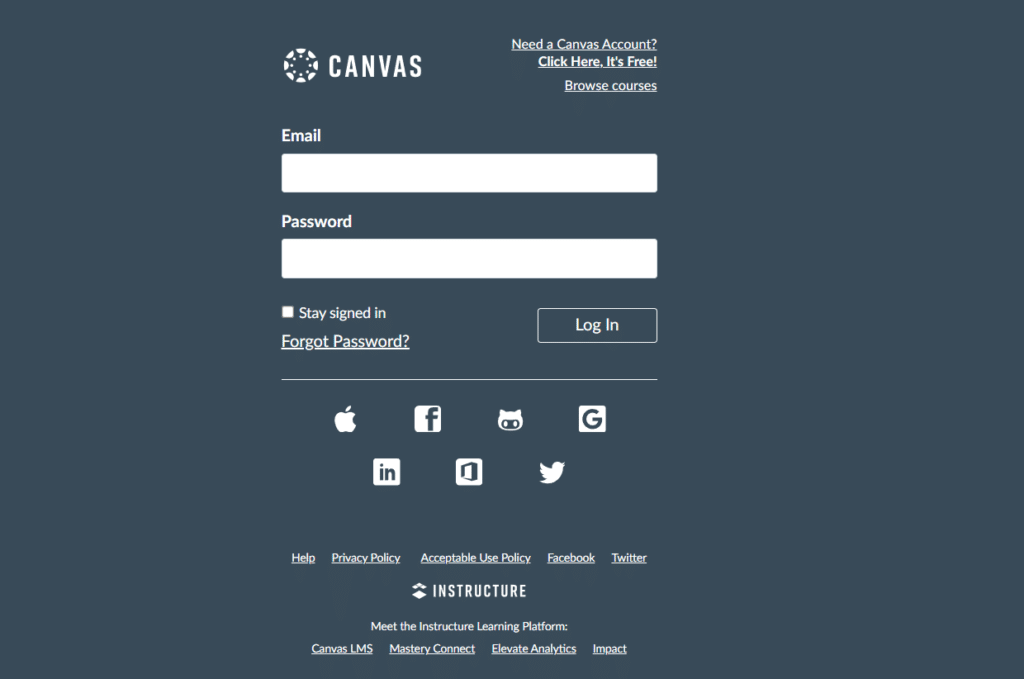
Canvas by Instructure is a user-friendly LMS designed to make online learning accessible and engaging. It features a mobile-responsive design, allowing learners to access content on various devices. Canvas also supports seamless integration with third-party tools, fostering a dynamic and enriched learning experience. Additionally, it provides robust analytics and reporting, enhancing instructors’ ability to monitor student performance. Collaboration and communication tools are integrated to facilitate interaction among learners and instructors.
Features:
- User-friendly interface
- Mobile-responsive design
- Integration with third-party tools
- Analytics and reporting
- Collaboration and communication tools
3. Cornerstone OnDemand
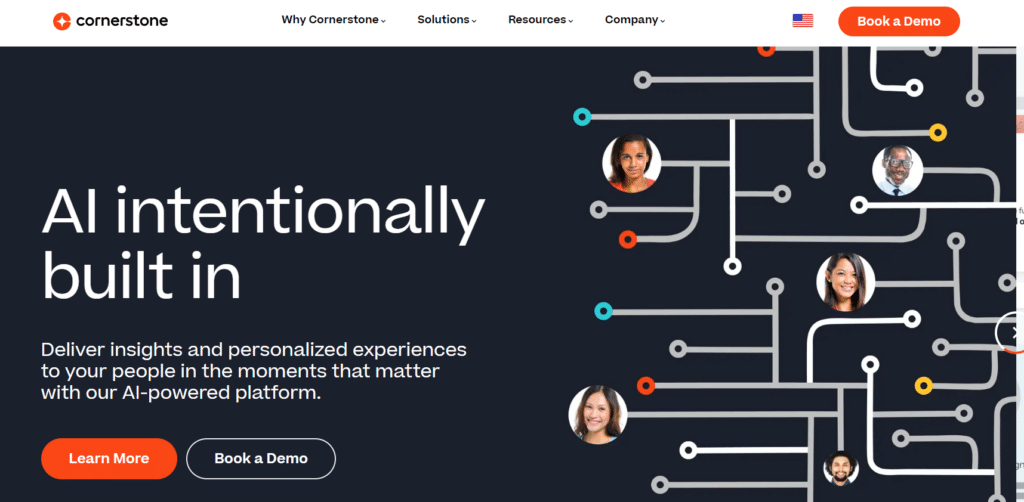
Cornerstone OnDemand is a comprehensive talent management suite that includes a Learning Management System. It offers a holistic approach to talent development, allowing organizations to create personalized learning paths for employees. Compliance tracking is a strong suit of Cornerstone, ensuring that organizations meet regulatory and industry standards. The platform also incorporates social learning features and performance management tools, making it a valuable tool for talent development.
- Talent management suite
- Personalized learning paths
- Compliance tracking
- Social learning features
- Performance management
4. Adobe Captivate Prime
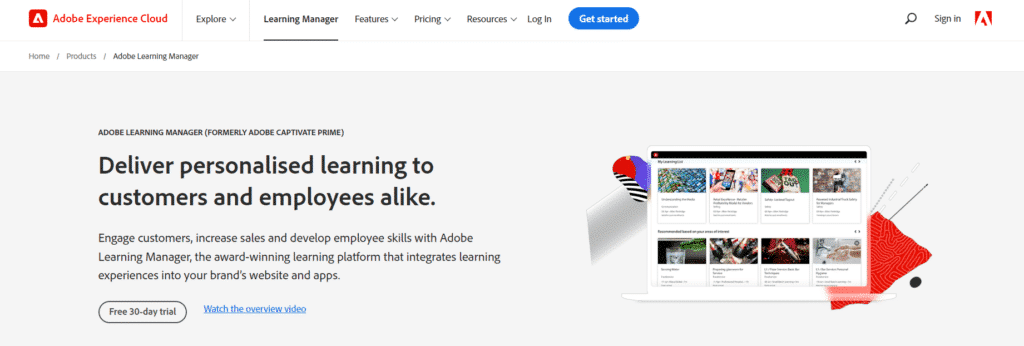
Adobe Captivate Prime is an intuitive and user-friendly LMS that provides a seamless learning experience. It offers gamification and badges to motivate learners and increase engagement. One of its standout features is AI-driven recommendations that suggest personalized content to learners, enhancing their learning journey. Captivate Prime also includes dynamic skill mapping, allowing organizations to align training with specific skill development needs. Moreover, it provides content authoring tools for creating custom e-learning content.
Features:
- Intuitive UI
- Gamification and badges
- AI-driven recommendations
- Dynamic skill mapping
- Content authoring tools
5. SAP Litmos
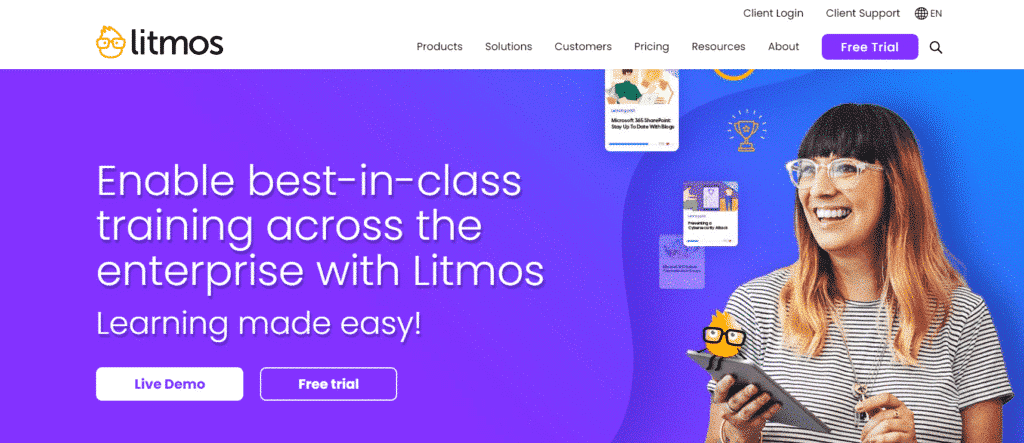
SAP Litmos is a cloud-based and scalable LMS designed for organizations of all sizes. Its multi-device support ensures that learners can access content on various platforms. It offers robust compliance and certification management features, which are crucial for industries with strict regulatory requirements. Integration with Customer Relationship Management (CRM) and Human Resources (HR) systems streamlines administrative processes. SAP Litmos excels in real-time reporting and analytics, providing insights into learner progress and course effectiveness.
Features:
- Scalable and cloud-based
- Multi-device support
- Compliance and certification management
- Integration with CRM and HR systems
- Real-time reporting and analytics
Things to consider while choosing learning management systems
Selecting the right Learning Management System (LMS) is a crucial decision for educational institutions, businesses, and organizations looking to manage, deliver, and track their training and educational programs effectively. With a multitude of LMS options available in the market, it’s essential to carefully consider your specific needs and goals before making a decision. In this section, we will explore the key factors to keep in mind when choosing an LMS.
Your organizational goals and objectives
The first step in selecting an LMS is to clearly define your organizational goals and objectives. Are you looking to enhance employee training, provide remote learning, or offer online courses to a wider audience? Understanding your specific requirements and long-term goals will help you choose an LMS that aligns with your mission and vision.
User-friendly interface
The ease of use is a critical factor when selecting an LMS. An intuitive, user-friendly interface can significantly impact the adoption rate and overall user satisfaction. Consider the needs of both administrators and learners when evaluating the interface. A well-designed LMS should streamline content creation, management, and delivery, while also offering a seamless learning experience for users.
Content management and delivery
Evaluate the LMS’s content management and delivery capabilities. It should support a variety of content formats, including text, videos, quizzes, and assessments. Look for features like content scheduling, automated notifications, and content tracking to ensure that your learners receive the right materials at the right time.
Scalability and flexibility
Consider the scalability and flexibility of the LMS. Your organization may grow, and your learning needs may evolve over time. Ensure that the chosen LMS can adapt to your changing requirements. Look for one that offers customization options, integrations with other tools, and the ability to scale up or down as needed.
Conclusion
In today’s dynamic business landscape, investing in a robust Learning Management System is crucial for enhancing employee skills, compliance, and overall performance. As you navigate the ever-evolving world of corporate learning, the right LMS can be the key to unlocking your employees’ full potential. Choose wisely and empower your workforce to thrive in the ever-changing business environment. Remember, the best LMS is the one that aligns seamlessly with your organization’s unique goals and objectives, making the journey of learning and development a fruitful one for both your employees and your business.








